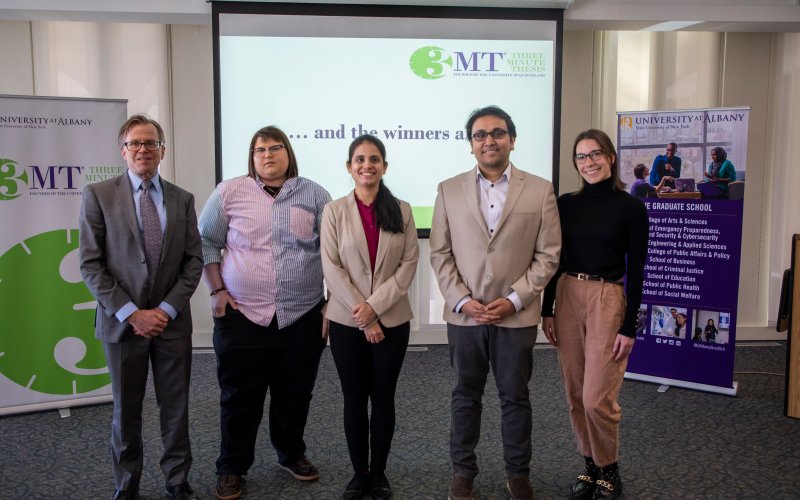The Graduate School Hosts 5th Annual Three Minute Thesis Competition

By Erin Frick
ALBANY, N.Y. (March 21, 2023) — Explaining complicated research to a lay listener is often tricky business. Now imagine condensing years of graduate research into a three-minute talk — no props, videos or jargon allowed. This is the premise of the Three Minute Thesis (3MT) competition, which got its start at the University of Queensland in 2008 and has since been adopted by 900 institutions in more than 85 countries around the world.
On Thursday, March 9, The Graduate School hosted the final round of UAlbany’s 5th annual 3MT competition. A total of 24 students submitted videos and slides to present their research virtually in the preliminary round. Preliminary round judges included Jordan Carleo-Evangelist, director of communications and University spokesperson, Colleen Davis, assistant dean for academic affairs in The Graduate School, and Rixiang Huang, assistant professor in Environmental and Sustainable Engineering. Topics were wide-ranging and included work on tuberculosis, social media hashtags and student mental health — just to name a few. The six highest scoring preliminary round participants advanced to the final round and one step closer to potentially winning and a cash prize.
3MT challenges graduate students from any field to present their research in a strictly timed window, using a single animation-free PowerPoint slide for support. Presentations are judged on how clearly the speaker conveys their research — including the motivation for the work, primary questions, findings and impact — in terms that a general audience can easily understand.
This year’s final competition was held in-person in the Campus Center. Judges included Melissa Connolly, vice president for communications and marketing, Satyendra Kumar, associate vice president for research, and Sheila Seery, vice president for government and community relations. Attendees voted for the People’s Choice winner.
The 2023 winners:
First Place ($1,000) and People’s Choice ($250)
Mónica Ventura, Chemistry — “The Twig is Up: Stopping Illegal Loggers in Their Tracks”
Project Synopsis:
Illegal logging is a leading threat to the health of the Amazon rainforest and the many endangered plant and wildlife species that call it home. While this is known to be a widespread problem, it can sometimes be impossible to differentiate between legal and illegal timber at ports, since many types of wood look very similar to the naked eye.
To circumvent the shortcomings of visual inspections, Ventura developed a method to identify tree species chemically by analyzing a sample of the wood. Her analysis yields a chemical “fingerprint” unique to each tree species. By comparing this fingerprint against a database of tree chemical signatures, authorities can quickly determine whether the wood is legal or not — and stop illegal loggers in their tracks.
Second Place ($750)
Jayanta Talukder, Economics — “Reverse Migration and Occupational Choice: Evidence from COVID Induced Lockdown in India”
Project Synopsis:
Early in the COVID-19 pandemic, India underwent a nationwide lockdown that rendered nearly 150 million migrant workers unemployed overnight. Many of these individuals returned to their home states to find employment, with many turning to agriculture for work.
Talukder gathered data from government transportation departments and drew a sample of over 1,200 migrant workers from the state of Madhya Pradesh, who he surveyed via phone. He found that the biggest factor motivating migrants’ decision to change their occupation was the ownership of agricultural land, which they used as a temporary means of income until restrictions were relaxed — at which point, many returned to their pre-pandemic jobs. His findings revealed that lockdown restrictions caused more economic disruption than the pandemic itself. This work sheds light on the institutional need to create economic crisis management systems that place greater emphasis on the outcome of immediate events.
Third Place ($500)
JJ Käthe, Biodiversity, Conservation and Policy – “Bugs, Woods, and Drinking Water”
Project Synopsis:
Spotted lanternfly, an invasive insect pest that attacks over 100 plant species, arrived in the U.S. from China in 2014. It got its start in Pennsylvania and has since spread rapidly, devastating forest plants and agricultural crops in surrounding states and beyond. While impacts such as reduced climate resilience for forests and major losses for farmers are clear, a less obvious effect is its influence on watershed health and drinking water.
The bug excretes a sugary substance as it feeds that grows mold and harms the forest understory. Damage to forests, together with factors such as pesticides and climate change, degrade watershed health, with implications for water quality. Käthe assessed reservoirs that supply drinking water to New York City, looking at factors including climate, water quality, how much forest is present in the surrounding watershed and how much of it is at risk of lanternfly infestation. Using this list, Käthe ranked the sites in order of risk – to point land managers to places where early interventions against lanternfly could be most impactful.
The 2023 finalists:
- Jamie Corro, Biomedical Sciences — “Visualization of Isoniazid Persistence in Mycobacteria with Hibernating Ribosomes”
- Pallavi Khurana, Communication — “How Do Social Media #Hashtags Influence Impression Formation?”
- Shangyun Zhou, Counseling Psychology — “Intervening Suicidal Ideation in Asian College Students – The Roles of Family Perfectionism, Familial Interpersonal Needs, Familial Meaning in Life”




